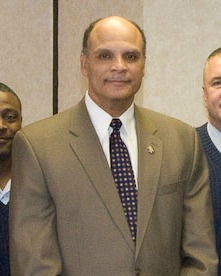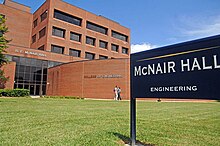
Drexel University is a private research university with its main campus in Philadelphia, Pennsylvania. Drexel's undergraduate school was founded in 1891 by Anthony J. Drexel, a financier and philanthropist. Founded as Drexel Institute of Art, Science and Industry, it was renamed Drexel Institute of Technology in 1936, before assuming its current name in 1970. As of 2020, more than 24,000 students were enrolled in over 70 undergraduate programs and more than 100 master's, doctoral, and professional programs at the university.

The University of North Carolina at Greensboro is a public research university in Greensboro, North Carolina. It is part of the University of North Carolina system. It is accredited by the Southern Association of Colleges and Schools Commission on Colleges to award baccalaureate, master's, specialist, and doctoral degrees.
The Wharton School is the business school of the University of Pennsylvania (UPenn), a private Ivy League research university in Philadelphia. Established in 1881 through a donation from Joseph Wharton, a co-founder of Bethlehem Steel, the Wharton School is the world's oldest collegiate business school.

The University of North Carolina at Charlotte is a public research university in Charlotte, North Carolina. UNC Charlotte offers 24 doctoral, 66 master's, and 79 bachelor's degree programs through nine colleges. It is classified among "R2: Doctoral Universities – High research activity".

North Carolina Agricultural and Technical State University is a public, historically black, land-grant research university in Greensboro, North Carolina. It is a constituent institution of the University of North Carolina System. Founded by the North Carolina General Assembly on March 9, 1891, as the Agricultural and Mechanical College for the Colored Race, it was the second college established under the provisions of the Morrill Act of 1890, as well as the first for people of color in the State of North Carolina. Initially, the college offered instruction in agriculture, English, horticulture and mathematics. In 1967, the college was designated a Regional University by the North Carolina General Assembly and renamed North Carolina Agricultural and Technical State University.

Nanotechnology education involves a multidisciplinary natural science education with courses such as physics, chemistry, mathematics, and molecular biology. It is being offered by many universities around the world. The first program involving nanotechnology was offered by the University of Toronto's Engineering Science program, where nanotechnology could be taken as an option.

Chiba University is a national university in the city of Chiba, Japan. It offers Doctoral degrees in education as part of a coalition with Tokyo Gakugei University, Saitama University, and Yokohama National University. The university was formed in 1949 from existing educational institutions in Chiba Prefecture, and over a period of years absorbed Chiba Medical University (1923-1960), a preparatory department of the Tokyo Medical and Dental University, Chiba Normal School (1872-1951), Tokyo Polytechnic High School (1914-1951), Chiba Horticultural High School, among others. Chiba University was reincorporated in 2010 under the National University Corporation Act. Chiba University has been ranked 168th on the Asia University Rankings 2019 Top 100 by "The Times Higher Education". Its abbreviated form is Chibadai (千葉大).
The University of Virginia School of Nursing, established in 1901, is a school of nursing education. It has an enrollment of approximately 800 students, and is consistently rated in the top 4% of U.S. nursing schools. After the retirement of Dorrie K. Fontaine as the fifth dean of the School, two-term American Nurses Association President Pam Cipriano, a research faculty member at UVA for years, stepped in as interim dean in August 2019.
The Ivan Allen College of Liberal Arts is a college of the Georgia Institute of Technology, a public research university in Atlanta, Georgia. It is one of the six academic units at the university and named for former two-term Atlanta mayor Ivan Allen Jr., a Georgia Tech alumnus and advocate for the advancement of civil rights in America.

Wilmington University (WilmU) is a private university with its main campus in Wilmington Manor, Delaware, with a New Castle street address. It was founded in 1968 as Wilmington College by educator Donald E. Ross. As of 2016, the university served a total student body of 20,522 undergraduate and postgraduate students in nearly 100 degree and certificate programs. The university's programs are offered at its main campus in historic New Castle as well as at six additional campuses in Delaware, several partnership locations in New Jersey, and a single partnership location in northeastern Maryland.

The University of Central Florida College of Graduate Studies is an academic college of the University of Central Florida located in Orlando, Florida, United States. The college confers most professional and research master's degrees and doctoral degrees in various fields of study for the university. The departments under which instruction and research occur are housed in UCF's other schools and colleges. The administrative offices for the College of Graduate Studies are located in Trevor Colbourn Hall, Suite 205A, on UCF's main campus. The interim dean of the college is John Weishampel PhD.

Zhejiang Sci-Tech University is a university in Zhejiang province that provides programs in the fields of engineering, sciences, humanities (arts), economics, management and law with engineering being its main focus. It is run jointly by Ministry of Education and the Zhejiang provincial government, the latter being the main administrative body.
The Irwin and Joan Jacobs School of Engineering is an undergraduate and graduate-level engineering school offering BS, BA, MEng, MS, MAS and PhD degrees at the University of California, San Diego in San Diego, California. The Jacobs School of Engineering is the youngest engineering school of the nation's top ten, the largest by enrollment in the University of California system, as well as the largest engineering school on the West Coast and the ninth-largest in the country. More than thirty faculty have been named members of the National Academies. The current dean of the Jacobs School of Engineering is Albert P. Pisano.
The University of Wisconsin–Milwaukee is a doctoral-degree granting public research university that consists of 14 colleges and schools, and 70 academic centers, institutes and laboratory facilities. It offers a total of 180 degree programs, including 94 bachelor's, 53 master's and 32 doctorate degrees. The School of Freshwater Sciences is the only graduate school of freshwater science in the U.S. and the third in the world. The School of Architecture and Urban Planning, the College of Nursing and the College of Health Sciences are the largest in Wisconsin.
The College of Science at Virginia Tech contains academic programs in eight departments: biology, chemistry, economics, geosciences, mathematics, physics, psychology, and statistics, as well as programs in the School of Neuroscience, the Academy of Integrated Science, and founded in 2020, an Academy of Data Science. For the 2018-209 academic year, the College of Science consisted of 419 faculty members, and 4,305 students, and 600 graduate students The college was established in July 2003 after university restructuring split the College of Arts and Sciences, established in 1963, into two distinct colleges. Lay Nam Chang served as founding dean of the College of Science from 2003 until 2016. In 2016, Sally C. Morton was named dean of the College of Science. Morton served in that role until January 2021, when she departed for Arizona State University and Ronald D. Fricker—senior associate dean and professor in the Department of Statistics—was named interim dean of the College. In February 2022, Kevin T. Pitts was named the third official dean of the College of Science.

National University is a private university headquartered in San Diego, California, United States. Founded in 1971, National University offers academic degree programs at campuses throughout California, a satellite campus in Nevada, and various programs online. Programs at National University are designed for adult learners. On-campus classes are typically blended learning courses, concentrated to four weeks or on weeknights with occasional Saturday classes. The university uses asynchronous learning and real-time virtual classrooms for its online programs.
The history of North Carolina Agricultural and Technical State University, the first land grant college for people of color in the state of North Carolina, can be traced back to 1890, when the United States Congress enacted the Second Morrill Act which mandated that states provide separate colleges for the colored race. The "Agricultural and Mechanical College for the Colored Race" was established On March 9, 1891 by an act of the General Assembly of North Carolina and began in Raleigh, North Carolina as an annex to Shaw University. The college made a permanent home in Greensboro with the help of monetary and land donation by local citizens. The college granted admission to both men and women from 1893 to 1901, when the board of trustees voted to restrict admission to males only. This policy would remain until 1928, when female students were once again allowed to be admitted.

Lewis Carnegie Dowdy was an American educator and the sixth president, and first chancellor of North Carolina Agricultural and Technical State University.

Harold L. Martin Sr. is an American engineer and educator who is Chancelor Emeritus of North Carolina Agricultural and Technical State University and former chancellor of Winston-Salem State University.
The Graduate School of Princeton University is the main graduate school of Princeton University. Founded in 1869, the school is responsible for all of Princeton's master's and doctoral degree programs in the humanities, social sciences, natural sciences, and engineering. The school offers Master of Arts (MA), Master of Science (MS), and Doctor of Philosophy (PhD) degrees in 42 disciplines. It also administers several pre-professional programs, including the Master in Finance (M.Fin.), Master of Science in engineering (M.S.E.), and Master of Engineering (M.Eng.), Master in Public Affairs (M.P.A.), Master in Public Policy (M.P.P.), and Master of Architecture (M.Arch.) degrees.














